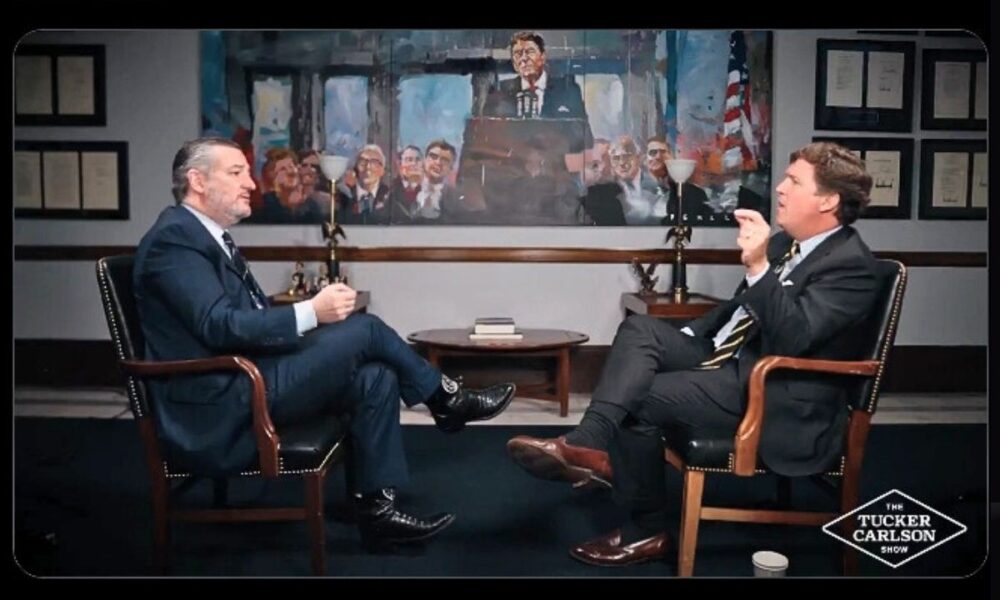Amid the ongoing Israel-Iran conflict that’s dominated headlines and public debate, a recent interview between Tucker Carlson and Senator Ted Cruz has gone viral, highlighting a growing rift among conservatives over the role the United States should play in global conflicts.
The interview, which quickly gained traction online, covered a range of foreign policy topics, including regime change in Iran, U.S. military aid to Israel, and the influence of foreign lobbying groups in Washington.
Cruz opened the interview by reaffirming his strong support for Israel and expressing concern over Iran’s nuclear ambitions.
“Is America better off with a country that has a leader who hates us and wants to kill us? Or to have a country with a leader who likes us and wants to be friends with us?” Cruz stated in the interview.
Cruz pointed to Iran’s leadership promoting chants of “Death to America” and emphasized the importance of preventing the country from acquiring nuclear weapons.
However, Cruz clarified that he does not support military action to force regime change in Iran. He positioned himself between traditional interventionist and isolationist doctrines, calling for a strategy he described as assertive but restrained.
“I think Donald Trump’s foreign policy is very much what I am describing — a non-interventionist hawk,” Cruz told Carlson.
Carlson appeared to agree on that characterization of Trump’s approach, but the two soon diverged over the specifics of the Israel-Iran conflict.
Carlson raised concerns about America’s domestic challenges—including retirement instability and rising prices—and questioned why U.S. taxpayers should fund foreign military efforts while problems at home persist.
Cruz responded by noting that the U.S. provides $3 billion in military assistance to Israel annually.
The interview took a sharp turn when Carlson pressed Cruz on the conduct of Israel’s intelligence agency.
“Is it in America’s interest for Israel to spy on us, including the President?” Carlson asked.
“Israel spies on us — well, so does every other country,” Cruz responded.
Carlson also raised concerns about the American Israel Public Affairs Committee (AIPAC), asking why the organization isn’t considered a foreign lobby, given its advocacy.
Cruz rejected that characterization, stating that AIPAC lobbies for a stronger U.S.-Israel relationship, not on behalf of the Israeli government.
“I came into the Congress 13 years ago with the stated intention of being the leading defender of Israel in the United States Senate, and I’ve worked every day to do that,” Cruz told Carlson.
Carlson pushed further, questioning Cruz’s deep focus on Israel.
“My understanding is that [AIPAC] lobbies on behalf of the Israeli government,” Carlson said. “What does it lobby for?”
Cruz denied AIPAC was a foreign lobby and instead cited his Christian faith as a central reason for his position.
“Biblically, we are commanded to support Israel,” Cruz said.
Cruz argued that Israel faces the same enemies as the United States in the Middle East, highlighting reports of Iran’s attempt to assassinate former President Donald Trump.
Carlson questioned the seriousness of those reports, asking why the U.S. hasn’t declared war on Iran if they were true.
“I don’t think it’s very effective,” Cruz said.
Cruz emphasized the value of targeting Iran’s nuclear infrastructure and senior leadership but stopped short of advocating for occupation or regime change, referencing the failures of the Iraq War—an assessment Carlson agreed with.
Despite their disagreements, both men concluded the interview in agreement that President Trump’s foreign policy has been a net positive for America.


